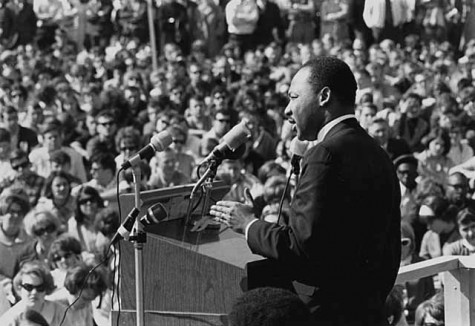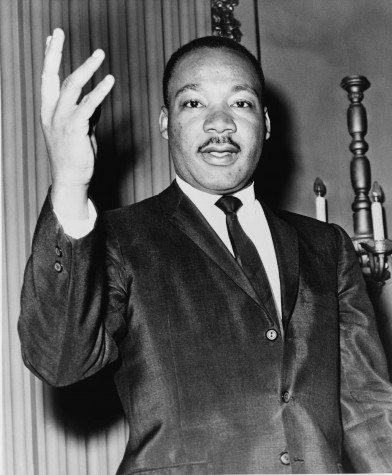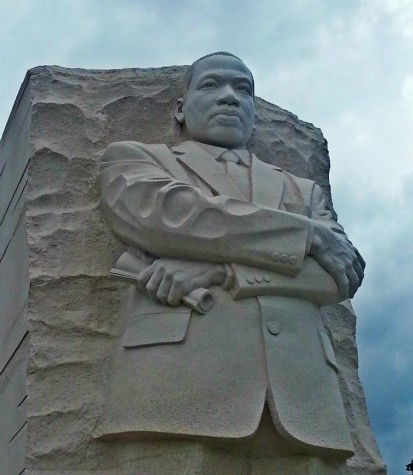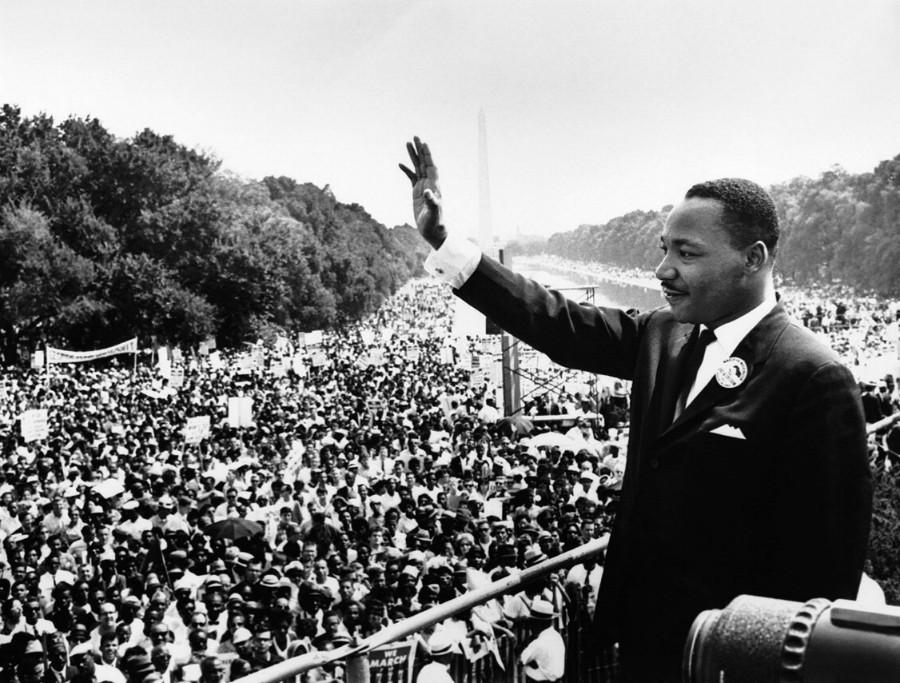IMAGE / WIkimedia Commons
Martin Luther King Jr. addresses a crowd from the steps of the Lincoln Memorial where he delivered his famous “I Have a Dream” speech during the Aug. 28, 1963, March on Washington, D.C.
MLK Day honors King’s dream, legacy
January 18, 2015
The Rev. Dr. Martin Luther King Jr. was a man who had a dream — a dream of equality, a dream of freedom for all.
King was born on Jan. 15, 1929, in Atlanta.
His legal birth name was Martin King but was changed to Martin Luther King after his father traveled to Germany in 1934. The name gives homage to German reformer Martin Luther.
Growing up in Atlanta, King attended Booker T. Washington High School. He was part of the school’s debate team, making his public speaking ability known.
In King’s junior year, Morehouse College announced that, because World War II was contributing to a lack of student participation, it would accept any high school junior that passed its entrance exam.
King was intelligent. He passed the exam at age 15 and entered Morehouse College.
In 1948, King graduated with a Bachelor of Arts degree in sociology.
He then enrolled in Crozer Theological Seminary in Chester, Pa., and graduated with a Bachelor of Divinity degree in 1951.
At age 25, King became pastor of the Dexter Avenue Baptist Church in Montgomery, Ala.
King’s Christian faith was strongly based in Jesus’ commandment of loving your neighbor as yourself and loving your enemies. King’s beliefs were the reason for his stance on peaceful protesting.
Becoming a civil rights activist at a young age, King aimed for a peaceful revolution that would bring forth the end of racial segregation.
He was the chief spokesman for non-violent activism in the civil rights movement, which protested racial discrimination in federal and state laws.
Mr. Jack Linn, U.S. history teacher, said that King brought awareness to the inequality and violence that black Americans throughout the south were experiencing.
“(King) fought for educational rights for groups like the Little Rock Nine and James Meredith,” Linn said. “He strived for basic human rights, for blacks and whites to be able to sit in the same restaurants, theaters, and tables.”
What were some of the feats accomplished by King?
In 1955, King led the Montgomery Bus Boycott, ending segregation in public busing.
A few years later, in 1957, he helped found the Southern Christian Leadership Conference, serving as its first president.
In 1962, King led an unsuccessful struggle against segregation in Albany, Ga., along with organizing non-violent protests in Birmingham, Ala.
King helped to organize the 1963 March on Washington for Jobs and Freedom, where he delivered his famous “I Have A Dream” speech, demanding the passage of a civil rights bill: The Civil Rights Act of 1964.
It was in Washington, D.C., that King established his reputation as one of the greatest orators in American history.
He received the Nobel Peace Prize Oct. 14, 1964, for his acts in non-violently combating racial inequality, marking him as the youngest person to receive the award at that time.

King speaking to an anti-Vietnam war rally at the University of Minnesota, St. Paul, on April 27, 1967.
A few months later, in 1965, King and the SCLC organized the Selma to Montgomery marches.
King took his movement to Chicago in 1966 to work on ending housing segregation.
In 1967, King expanded his focus to poverty and speaking against the Vietnam War, giving a speech titled “Beyond Vietnam” in New York City.
Tragically, on April 4, 1968, King was planning a national occupation in Washington, D.C., to be called the “Poor People’s Campaign,” when he was assassinated in Memphis, Tenn.
Just days after King’s assassination, Congress passed the Civil Rights Act of 1968, prohibiting discrimination on the basis of race, religion, or national origin in housing and related matters.
The act was seen as a tribute to King’s efforts in combating housing discrimination.
On Feb. 4, 1968, two months before his assassination, King spoke ominously about how he wished to be remembered after his death.
“I want you to be able to say that day that I did try to feed the hungry. I want you to be able to say that day that I did try in my life to clothe those who were naked,” King said, referring to the day he dies. “I want you to say on that day that I did try in my life to visit those who were in prison. And I want you to say that I tried to love and serve humanity.”
After King’s death, he was awarded the Presidential Medal of Freedom, along with the Congressional Gold Medal.
Beginning in 1971, cities began to establish annual holidays in honor of King.
A bill about a federal holiday honoring him on his birthday first came to a vote in Congress in 1979. However, the bill fell just five votes short of being passed.
Because King was a private citizen, meaning he never held public office, the idea of the holiday was seen as “breaking the tradition” of dedicating federal holidays mainly to people who have held public office.
The idea of the holiday did not stop then, though.
After musician Stevie Wonder released his song titled “Happy Birthday” in 1980, in which Wonder sings about a national holiday to honor King’s dream of integration and “love and unity for all of God’s children,” the campaign for the holiday was popularized.

King in 1964.
Later, a petition to Congress with six million signatures in favor of the adoption of a holiday honoring King showed the president and Congress that the people believed King’s actions deserved recognition.
Finally, on Nov. 2, 1983, President Ronald Reagan signed a bill creating the federal holiday Martin Luther King Jr. Day, or MLK Day.
The first MLK Day was observed on Jan. 20, 1986.
This day is celebrated on the third Monday of January of each year, keeping it around the time of King’s Jan. 15 birthday.
On Jan. 17, 2000, for the first time, MLK Day was officially observed in all 50 states.
MLK Day is a time when the nation pauses to remember King’s life and work and also to honor the legacy King made for himself through his selfless efforts in bringing forth racial equality.
Many people have the day off school and work, all in honor of the Rev. Dr. Martin Luther King Jr.
Mr. Ed Councilor, history teacher, said that the holiday “celebrates a great man who wanted a better life for all people.”
“It’s about honoring a man who made the ultimate sacrifice for all people, to better the lives of all people,” Councilor said. “King sped up integration because of his non-violent approach. That got a lot of people to follow him. He prompted change.”
MLK Day is seen by many as a day to promote equal rights for all Americans, regardless of their background.
Some educational establishments use the day to teach students about the work of King and the struggle against racial segregation and racism.
Recently, federal legislation has been encouraging Americans to give some of their time on MLK Day by volunteering in citizen action groups.
What does the holiday mean to students?
After The Eclipse talked to more than 30 students, it found that the importance of MLK Day is not well-known. Many students only see it as a day off school.
But some students did understand what the holiday is about.
Junior Chris Ropp said MLK Day is about “the freedom and independence for black women and men.”
For Junior Chris Dye, students should at least think about the holiday’s meaning.

“The Stone of Hope”: The Martin Luther King Jr. Memorial in Washington, D.C., completed in 2011.
“Martin Luther King Day is a day off school,” Dye said. “However, while not at school, we should be celebrating the acts of all people, along with the efforts made by King.”
Sophomore Neil Kagerer said the holiday represents the fight for freedom during the civil rights movement.
Senior Nia Hatter agrees with that sentiment and said MLK Day is also about equality.
“It’s important to us (black) people because Martin Luther King fought for our rights to be equal,” Hatter said.
Sophomore Jalen Taylor said the holiday is important to honor King for what he did for minorities.
“He helped us to unite as a group,” Taylor said, “and to be able to go to the same schools and do the same public activities.”
Junior Zyaire Bo’hannon said that MLK Day is a method of promoting equality by “partnering a meaningful piece of history with a celebration.”
Bo’hannon sees MLK’s legacy as bringing people of different backgrounds together even though they may be different.
“(The holiday is) a day to move forward and realize that instead of trying to categorize all humans as one, we should accept our differences,” Bo’hannon said. “This includes race, nationality, religion, and all other aspects of who we are as a culture.”
